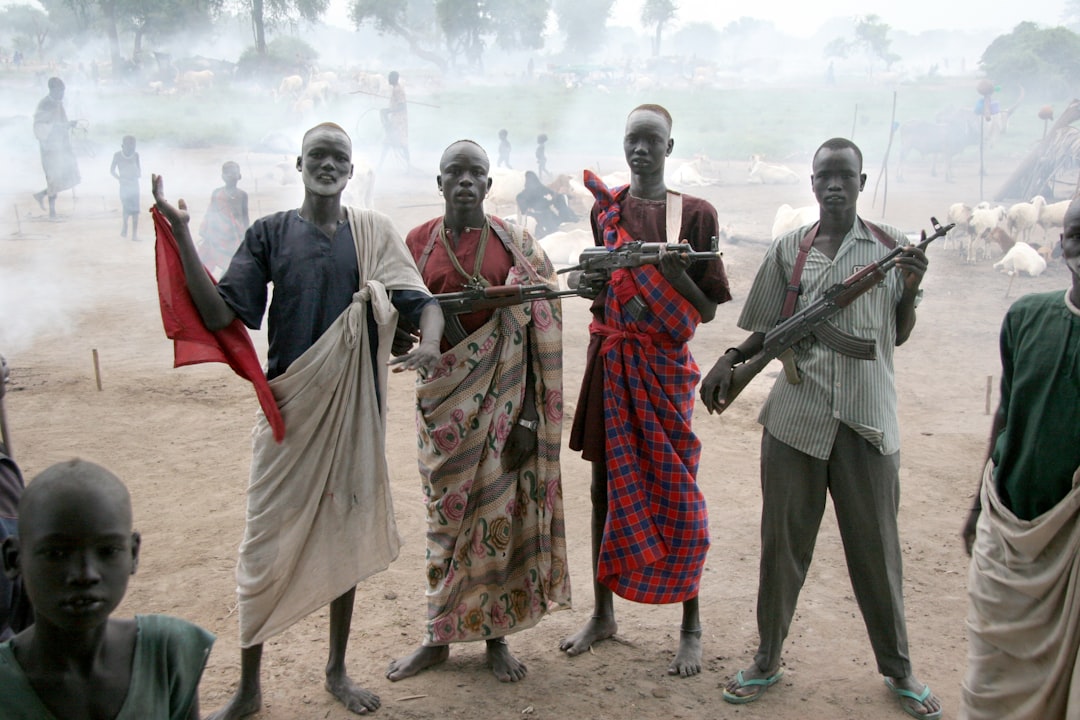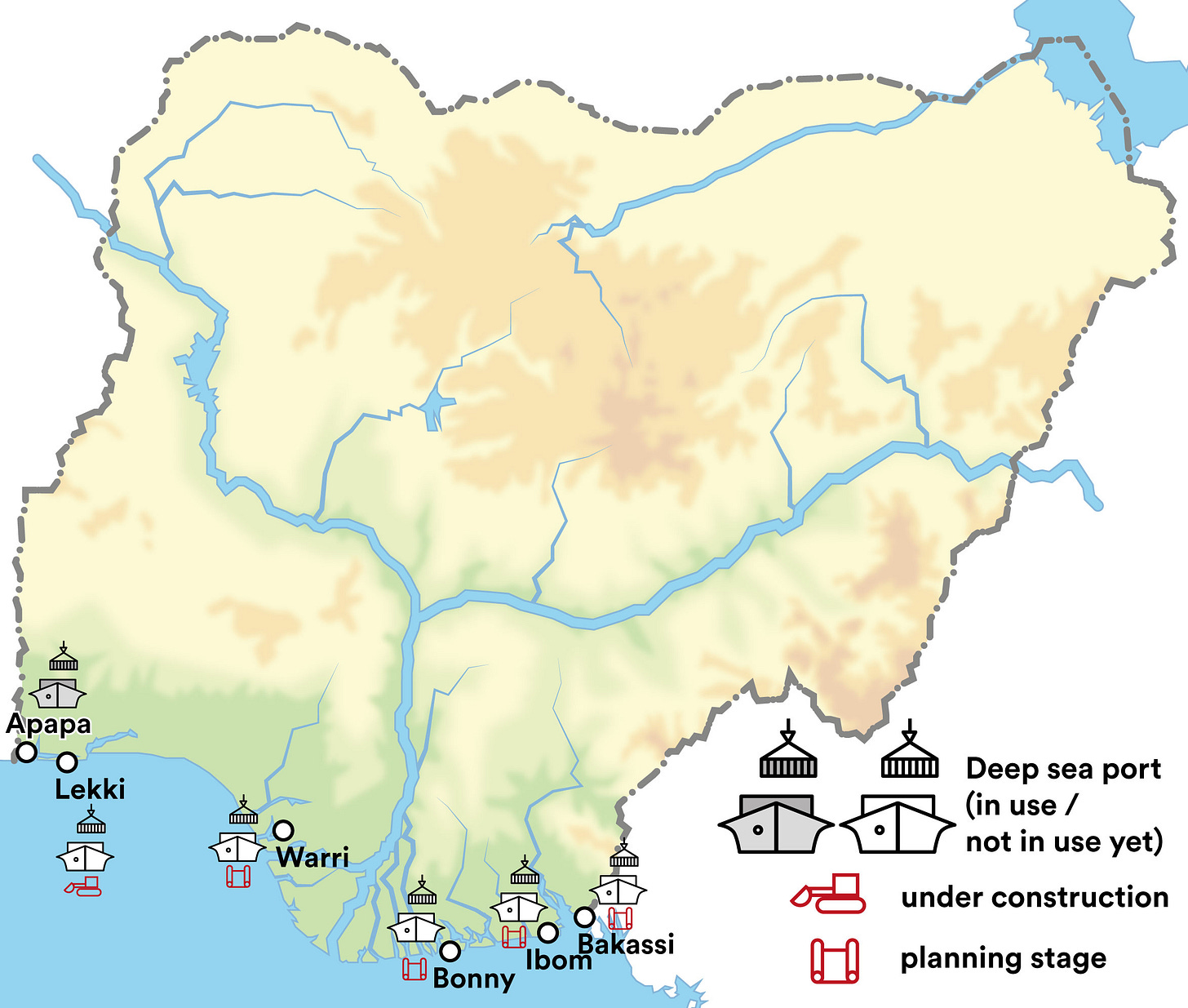🔅 Is the U.S. in Africa to stay?
Plus: Nigeria’s deep sea upgrade, WHO sounds the alarm, Uganda’s oil drilling starts, And much more… ☕
Photo of the day: South Sudan

If you’re a regular here, hit that share button. Tell your friends or colleagues about how Baobab will get them smarter on African business, money and current affairs in less than 5 minutes a day, for free!
Markets:
🔻 Nigerian SE: 52,599.65 (-0.02%)
🔻 Johannesburg SE: 79,725.46 (-0.39%)
🔻 Ghana SE: 2,431.59 (-0.02%)
🔺 Nairobi SE: 126.63 (+1.05%)
🔻 US S&P 500: 4,003.87 (-0.33%)
🔺 Shanghai Composite: 3,264.81 (+0.76%)
China Inflation? China's approach to the pandemic and its economic recovery was a bit different from the rest of the world. While the rest of the world was handing out cash like it was going out of style, China decided to play the long game by propping up employers instead. But it turns out that this strategy has left Chinese households sitting on a whopping $720 billion in savings, like a dragon hoarding a pile of gold. This could cause significant inflationary pressures in the future when the spending starts.
*Data accurate as of the close of markets across the continent
GEOPOLITICS
Is the U.S. in Africa to stay?

U.S. Treasury Secretary Janet Yellen's three-country trip to Africa is part of the United States' goal to show the continent that the US is a true partner.
However, after decades of losing ground to China and the troubled Trump years, when he threatened to roll back significant aid and military support, it looks like a tough sell.
The continent is currently struggling economically, what with the COVID-19 pandemic, the war in Ukraine, and inflationary pressures partly caused by the U.S.' own monetary policy with rate hikes leading to an appreciation of the dollar. As it struggles through these headwinds, Africans are asking, is the U.S. here for the long haul?
The U.S. monetary policy is also affecting African economies, with rate hikes by the Federal Reserve leading to tightening financial conditions and an appreciating dollar, which has had dire consequences for most African economies.
What proof does the U.S. have?
Thus far, Yellen's trip has primarily seen her call for action to combat food insecurity on the continent. Her trip follows a summit in Washington late last year, at which 49 African leaders were courted and to which the United States committed $55 billion in investment over three years. President Biden said the U.S. was "all in" on Africa's future.
After Yellen, Africa can expect to receive a series of other high-level U.S. visitors, including Joe Biden himself, Vice President Kamala Harris, Trade Representative Katherine Tai, and Commerce Secretary Gina Raimondo.
So, is the U.S. there to stay in Africa?
It is unclear if the United States can establish a long-term, sustained presence in Africa.
The Biden administration has renewed its commitment to ramping up trade and investment in the continent. Still, there are concerns that this engagement is "late", and that the United States may not be able to follow through on its promises if there is, for instance, a change in administration.
Additionally, the United States faces competition from China and Russia, which have established a strong presence in Africa through trade and investment. Chinese trade with Africa is about four times that of the United States and Beijing has also become an important creditor by offering cheaper loans than Western lenders. Yellen has warned Africa against "shiny deals that may [...] ultimately fail to benefit the people." For example, she accuses China of dragging its feet on a critical debt restructuring in Zambia.
It will take time and sustained effort for the United States to prove it wants a lasting partnership with Africa.
OTHER HEADLINES
Across the Continent

🇺🇳 WHO Sounds the Alarm | The World Health Organization (WHO) is sounding the alarm about contaminated cough syrups that have been linked to the deaths of over 300 children in the Gambia, Indonesia, and Uzbekistan. The syrups in question were found to have high levels of diethylene glycol and ethylene glycol, toxic chemicals typically used as industrial solvents and antifreeze agents. These chemicals can be fatal even in small amounts, and should never be found in medicines. The WHO is calling for immediate and concerted action to protect children and has issued alerts for specific products, and called on countries to ensure that competent authorities have approved all medicines for sale. Additionally, it is asking governments and regulators to inspect manufacturers, increase market surveillance and take action where required, manufacturers to only buy raw ingredients from qualified suppliers, test their products more thoroughly and keep records of the process.
🇷🇼 🇨🇩 Rwanda and Congo Tension Escalates | Rwanda has fired on a Congolese military aircraft claiming it violated its airspace, escalating tensions between the two countries. The Congolese government has denied that the plane entered Rwandan airspace and has called the incident a "deliberate act of aggression that equals an act of war" aimed at sabotaging regional peace efforts. This comes amid accusations by Congo that Rwanda has been supporting rebel group M23 and calls by the United Nations, United States, France, and Germany for Rwanda to stop supporting the rebels. Congo has also accused Rwanda of supporting another rebel group that includes ethnic Hutus who participated in the genocide. This incident raises concerns about stability in the region ahead of Pope Francis's visit to Congo next week.
🇳🇬 Nigeria's Deep Sea Upgrade | Nigeria's President Muhammadu Buhari has officially opened the Lekki Deep Sea Port, a $1.5 billion port in the commercial hub of Lagos. The port, which China funded, is one of the biggest in West Africa and is expected to create hundreds of thousands of jobs and ease cargo congestion that costs billions of dollars in annual revenue, according to Lagos Governor Babajide Sanwo-Olu. The port is a joint venture between the Nigerian government, Lagos state, Singapore-based Tolaram Group and state-owned China Harbor Engineering Company, with the foreign companies owning a majority stake of 75%. Experts, however, have argued that the port will only make a minimal difference unless issues such as poor rail network connectivity and underinvestment in the automation of processes at the port are addressed.
🇺🇬 Uganda's Oil | Hold onto your drill bits because Uganda has officially launched its first oil drilling program and is ready to strike black gold. The Kingfisher field, part of a $10 billion scheme to develop Uganda's oil reserves under Lake Albert, is expected to produce 40,000 barrels per day at its peak. But don't get too excited because there's still a pipeline to build before we can ship that sweet crude to international markets via an Indian Ocean port in Tanzania. It's been nearly two decades since Uganda discovered commercial petroleum reserves, but a lack of infrastructure has repeatedly delayed production. The country is on a mission to meet its target of first oil output in 2025. Uganda's crude reserves are estimated at 6.5 billion barrels, of which 1.4 billion are recoverable.


FOOD FOR THOUGHT
Proverb of the Day
“A leader in the community without a pot belly is a stingy man.”
— Nigerian Proverb.
Like Baobab?
Don’t keep it to yourself. Share it with friends and colleagues using the easy one-click button below:
Otherwise, let us know how we’re doing by replying to this email.





